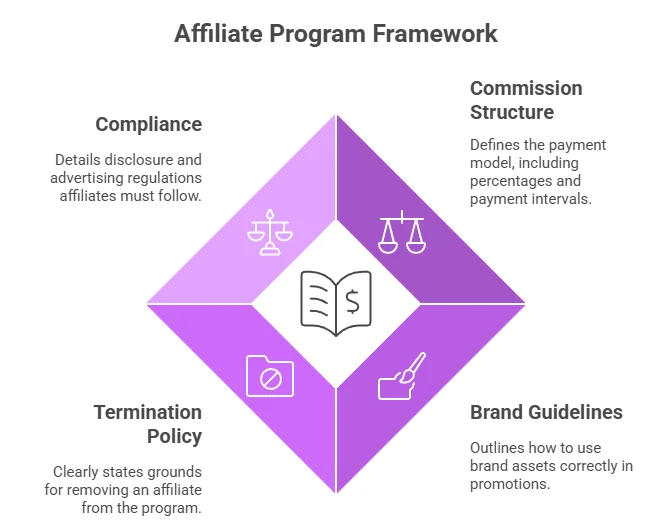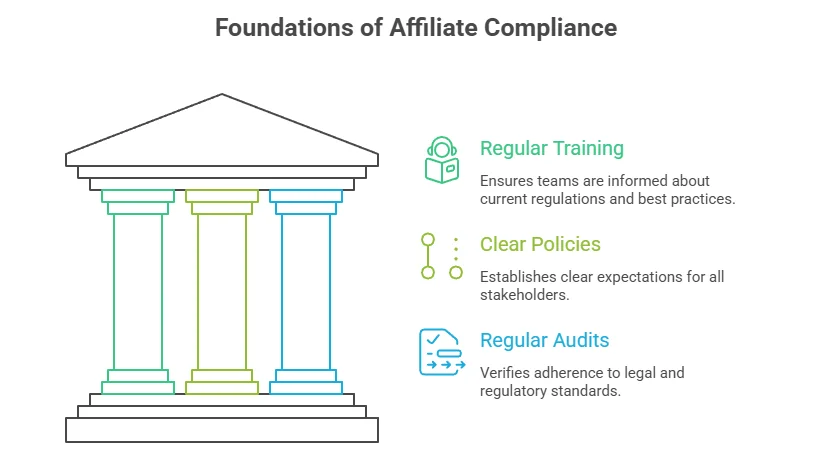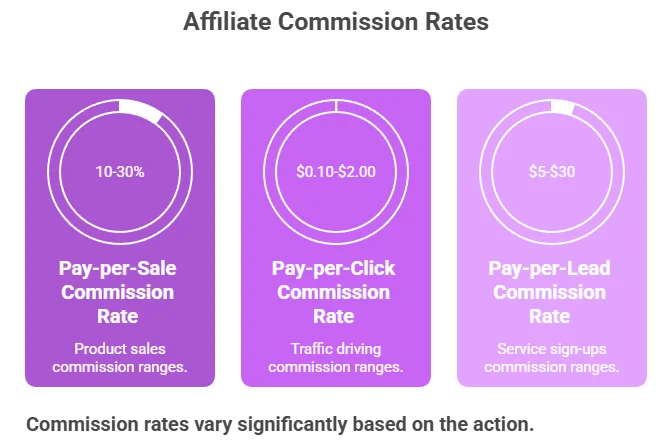
When launching an affiliate program, having clear and effective policies is essential. These policies not only guide your affiliates but also ensure that your program operates smoothly and maintains a strong brand image. Here are the fundamental elements that make effective Affiliate Program Policies.
Clarity in Terms and Conditions
Your affiliate program should start with clear terms and conditions. This includes outlining how your affiliates will earn commissions, the payment structure, and any specific requirements they need to fulfill. Make sure to state:
- Commission rates and how they may vary.
- Payment schedules and methods.
- Minimum payout thresholds.
By providing a comprehensive overview of these terms, you reduce misunderstandings and foster a more transparent relationship with your affiliates.
Compliance with Regulations
It’s critical to ensure your affiliate program complies with local and international regulations. You need to address:
- Disclosure: Affiliates must disclose their partnership with your brand, typically in the form of a disclaimer.
- Advertising Standards: Affiliates should only use approved advertising methods and adhere to legal requirements.
Your policies should detail the consequences of non-compliance to emphasize the importance of following the rules.
Brand Guidelines
Providing your brand guidelines is essential for maintaining a cohesive brand image across all channels. This includes instructions on:
- How affiliates can use your logos and trademarks.
- Messaging and tone when promoting your products or services.
- Approved marketing channels (e.g., social media, email marketing, etc.).
By clearly defining these parameters, you’ll help your affiliates represent your brand accurately and positively.
Communication and Support
Prompt communication is vital for the success of your affiliations. Outline how you will support your affiliates, including:
- Regular updates about products and promotions.
- Access to marketing materials and resources.
- Responsive customer support for any queries or issues.
Consider creating a dedicated communication channel, like a Slack group or an email newsletter, for sharing opportunities and important updates.
Termination Policies
Every affiliate program should have a clear termination policy. This should explain the situations that could lead to an affiliate being removed from the program, such as:
- Violation of terms and conditions.
- Unethical promotional practices.
- Consistent poor performance without prior improvement efforts.
This transparency helps set expectations and protects both your business and your affiliates.
Monitoring and Analytics
To evaluate the success of your affiliate program, it’s vital to include policies related to monitoring and analytics. You should specify:
- How performance will be tracked and shared with affiliates.
- The use of third-party tracking tools, if applicable.
- How often performance reviews will happen.
By doing this, you empower affiliates to optimize their strategies based on reliable data.
Payment and Compensation Structure
Explaining how affiliates will be compensated helps in motivating them. You should cover:
- Types of commissions (e.g., per sale, per lead, recurring commissions).
- Special incentives for high performers or during promotional campaigns.
This information keeps your affiliates aligned with your business goals and encourages them to perform better.
Example of Effective Policies
To illustrate an effective affiliate program policy, here’s a simple structure you might follow:
| Element | Description |
|---|---|
| Commission Structure | Define the payment model, including percentages and payment intervals. |
| Brand Guidelines | Outline how to use brand assets correctly in promotions. |
| Termination Policy | Clearly state grounds for removing an affiliate from the program. |
| Compliance | Detail disclosure and advertising regulations affiliates must follow. |

Effective policies can elevate your affiliate program, encouraging affiliates to actively participate and grow your business. Consider familiarizing yourself with resources that delve deeper into affiliate marketing regulations, such as the Affiliate Marketing Insights and Affiliate Marketing Association.
Well-defined Affiliate Program Policies set the stage for a successful collaboration between you and your affiliates. By adopting these essential elements, you pave the way for growth, engagement, and long-term success in your affiliate marketing efforts.
The Importance of Transparency in Affiliate Marketing
In the world of affiliate marketing, transparency plays a pivotal role in fostering trust between affiliates, merchants, and consumers. When every participant in the affiliate ecosystem understands the rules, expectations, and relationships at play, it cultivates a more effective and ethical marketing environment. By being upfront, businesses can improve their reputation and attract quality affiliates who share similar values.
Building Trust Through Transparency
Trust is a fundamental component of any successful business relationship. For affiliates, knowing the terms of their partnership with merchants is crucial. When transparency is prioritized, affiliates can share accurate information about products and services, making their promotions more credible. Here are some ways transparency enhances trust:
- Clear Affiliate Program Policies: Clearly defined policies help affiliates understand what is expected of them. This includes payment schedules, commission rates, and guidelines for using marketing materials.
- Open Communication: Maintaining a line of communication assists in resolving issues quickly, which is vital for retaining affiliate partnerships.
- Accurate Reporting: Providing affiliates with access to clear and accurate reporting tools helps them track their performance and earnings, ensuring that everyone is on the same page.
Encouraging Ethical Marketing Practices
Transparency in affiliate marketing is not just about honesty—it’s a critical factor in encouraging ethical practices. When affiliates are given clear guidelines, they are more likely to follow ethical marketing tactics. Here are specific aspects where this becomes evident:
- Disclosure of Affiliations: Affiliates are required to disclose their relationship with the merchant, which builds trust with their audience. This honesty can lead to better engagement and conversion rates.
- Quality Control: Clear rules can help prevent deceptive practices. For example, if affiliates know they cannot make false claims about products, they are less likely to do so, which protects consumer interests.
- Feedback Mechanisms: Encouraging feedback helps businesses improve their affiliate programs. Knowing what’s working and what isn’t allows for necessary adjustments.
The Role of Affiliate Program Policies
Affiliate Program Policies serve as the backbone of transparency. These policies outline the relationship between the merchant and the affiliate, and they help set expectations. Important components of Affiliate Program Policies often include:
- Commission structure: How and when affiliates are paid for their performance.
- Promotional guidelines: Specific details on how affiliates can market the products or services.
- Fraud prevention: Guidelines and measures to avoid deceptive practices.
- Termination clauses: Conditions under which either party can exit the partnership.
Consumer Benefits from Transparency
Ultimately, transparency doesn’t just benefit affiliates and businesses; consumers also stand to gain. When affiliate marketing is conducted transparently:
- Empowered Decision-Making: Consumers receive honest and clear information that allows them to make informed purchasing decisions.
- Better Product Reviews: Affiliates provide genuine reviews based on their authentic experiences, leading to better-informed consumers.
- Increased Brand Loyalty: Brands that practice transparency foster loyalty from consumers, as they are seen as trustworthy and reliable.
Implementing Transparent Practices
For businesses looking to improve their affiliate marketing strategy through transparency, consider the following best practices:
- Regularly update affiliate policies and communicate changes effectively.
- Offer training and resources for affiliates to understand ethical marketing practices.
- Encourage open dialogue and provide channels for feedback.
- Monitor compliance with affiliate policies consistently.
Transparency into affiliate marketing is not just beneficial; it’s necessary for long-term success. By fostering an environment of trust and openness, both affiliates and merchants can thrive. Are you interested in learning more about creating effective Affiliate Program Policies? Visit Affiliate Marketing for valuable insights and resources.
For a comprehensive understanding of the ethical practices in affiliate marketing, check out Transparency International. Their guidelines can be an excellent resource for both affiliates and companies.
By focusing on transparency, you can not only enhance your affiliate program’s reputation but also contribute positively to the overall landscape of affiliate marketing.
How to Craft a Fair Compensation Structure for Affiliates

Building a successful affiliate program necessitates meticulous attention to how you compensate your affiliates. A fair compensation structure not only motivates affiliates but also enhances your brand’s reputation. Here are key considerations to help you create an equitable payout system.
Understand Your Business Model
Before you create a compensation plan, grasp your business model. Are you selling products, services, or digital content? Each model may require a different approach. For example:
- Product Sales: Consider offering a percentage of the sale price as commission.
- Service Agreements: Flat fees may work better, especially for services achieved over time.
- Digital Products: Creative bonuses can motivate affiliates to push downloads or subscriptions.
Decide on Commission Types
Select the type of commissions you want to offer affiliates. Common structures include:
- Pay-per-sale (PPS): Affiliates earn a commission for each sale they drive.
- Pay-per-click (PPC): Affiliates receive payment for each visitor they send to your site, regardless of whether they make a purchase.
- Pay-per-lead (PPL): Affiliates get paid when they generate leads, such as sign-ups or inquiries.
Determine Commission Rates
Your commission rates should be attractive enough to entice affiliates but sustainable for your business. Here are some guidelines on setting those rates:
- Research industry standards to see what competitors are offering.
- Consider offering tiered commission rates. Higher sales result in higher percentages, rewarding high-performing affiliates.
- Evaluate your profit margins. Ensure your commission structure doesn’t cut too deeply into your profits.
Incorporate Bonuses and Incentives
Beyond standard commissions, additional incentives can keep affiliates motivated. Consider implementing:
- Performance Bonuses: If an affiliate hits a certain sales target, they receive a bonus.
- Referral Programs: Encourage affiliates to bring in more affiliates by offering bonuses for referrals.
- Seasonal Promotions: Introduce extra commissions during peak business periods.
Communicate Policies Effectively
Clear communication of your policies ensures that affiliates understand what to expect when promoting your brand. Make sure to:
- Draft a comprehensive affiliate agreement that outlines key points like payment terms, marketing guidelines, and termination clauses.
- Keep channels of communication open for ongoing support and queries.
- Regularly update affiliates on new marketing materials or changes in the compensation plan.
Track Performance and Adjust Accordingly
Using reliable software to monitor affiliate performance is crucial. Some popular platforms include ClickBank and Refersion.
Regularly review performance data to see if adjustments are needed. Analyze:
- Which affiliates are generating the most sales and which need support?
- How commissions are affecting your bottom line.
- Feedback from affiliates about the compensation structure.
Engage Your Affiliates
Building strong relationships with your affiliates can lead to better results. Strategies for engagement include:
- Regular newsletters updating affiliates on promotions, tips, and performance highlights.
- Offering exclusive access to new products or early launches.
- Creating a community where affiliates can share strategies and successes.
Implementing a fair compensation structure is crucial to attracting and retaining talented affiliates. By ensuring that your affiliates feel valued, you create a partnership that benefits both parties. Remember that open lines of communication, frequent adjustments based on performance insights, and a focus on rewards will foster a thriving affiliate program.
| Commission Type | Best For | Example Rate |
|---|---|---|
| Pay-per-Sale | Product Sales | 10-30% |
| Pay-per-Click | Traffic Driving | $0.10-$2.00 |
| Pay-per-Lead | Service Sign-ups | $5-$30 |
Compliance and Legal Considerations for Affiliate Programs
When participating in affiliate programs, it’s crucial to be aware of compliance and legal considerations. Understanding these factors can help protect your business and ensure a smooth partnership with affiliate networks. Here, we delve into the essential aspects you need to consider.
Understanding Affiliate Program Regulations
Affiliate programs are subject to various regulations that can impact both affiliates and program managers. Key regulations to consider include:
- FTC Guidelines: The Federal Trade Commission (FTC) requires that affiliates disclose their relationships with brands. Failing to disclose can lead to legal issues.
- Consumer Privacy Laws: Laws such as GDPR in Europe and CCPA in California influence how affiliates collect and store user data.
- Intellectual Property Rights: Affiliates should avoid using trademarked materials without permission to prevent legal complications.
Disclosure Requirements
When you join an affiliate program, transparency is vital. The FTC mandates that you must disclose your affiliate relationships both clearly and conspicuously. This could mean:
- Placing a disclosure statement at the beginning of your content.
- Using clear language that states your connection to the affiliate program.
For example, you might include a statement like “This post contains affiliate links. If you purchase through these links, I may earn a commission at no extra cost to you.” This not only builds trust with your audience but also helps you stay compliant with legal obligations.
Data Protection and Privacy
In today’s digital age, data protection is more critical than ever. Affiliates and program managers need to comply with various privacy laws like:
- General Data Protection Regulation (GDPR): This EU regulation mandates how companies should manage personal data. Ensure you have a clear privacy policy in place.
- California Consumer Privacy Act (CCPA): Similar to GDPR, it gives California residents the right to know what personal information businesses collect.
Make sure you’re transparent about data collection practices and only gather information that is essential for performance tracking and payment purposes.
Intellectual Property Considerations
Affiliates often rely on promotional materials provided by the business they represent. However, misuse of brand logos, images, or slogans could lead to trademark infringement. Here’s how to stay safe:
- Always use materials provided directly by the affiliate program.
- Obtain written consent before using any modified or original branding.
- Read the affiliate agreement thoroughly to understand what you’re allowed to use.
Best Practices for Compliance
To maintain compliance and avoid legal pitfalls, consider adopting the following best practices:
| Best Practice | Description |
|---|---|
| Regular Training | Keep your teams updated on the latest regulations and best practices in affiliate marketing. |
| Clear Policies | Create a solid policy document outlining expectations for all involved parties. |
| Regular Audits | Conduct periodic audits to ensure compliance with legal and regulatory standards. |

Fostering a clear understanding of compliance and legal considerations when participating in affiliate programs is essential for establishing trust and maintaining resilience in your affiliate business. By being proactive about disclosures, data protection, and intellectual property, you can create a positive and lawful affiliate marketing experience. Stay informed to stay in the game!
Strategies for Communicating Affiliate Program Policies to Participants
When running an affiliate program, clear communication of your policies is essential for building trust and ensuring compliance among participants. To achieve this, it’s important to have effective strategies in place. Consider the following approaches to communicate your Affiliate Program Policies effectively.
Establish Clear Guidelines
Start by providing detailed guidelines that outline expectations. This includes compensation structures, payout schedules, ethical marketing practices, and any restrictions or limitations. Make sure these guidelines are easily accessible to participants. Consider creating a dedicated page on your website where all policies are housed, ensuring it’s regularly updated.
Utilize Multiple Communication Channels
Using various communication channels is vital for reaching all participants. Here are some effective channels:
- Email Newsletters: Send periodic newsletters that include policy updates, tips, and highlights from your affiliate community.
- Webinars: Host live sessions to explain policies in detail and answer any questions affiliates may have.
- Social Media: Regularly post updates and reminders on your social media channels to keep your affiliates informed.
- Affiliate Dashboard: Integrate a section in the affiliate dashboard where participants can easily view the policies.
Provide Visual Aids
Many people process information better visually. Create infographics and charts to illustrate complex policies. For example, a flowchart detailing the commission structure or an infographic summarizing ethical guidelines can be incredibly helpful. These visuals can serve as quick references for participants. This approach enhances understanding and retention of your policies.
Encourage Feedback
Make it easy for your affiliates to provide feedback on the policies. This can help you identify areas of confusion or ambiguity. Use surveys or dedicated feedback forms to solicit input regularly. Responding to feedback shows affiliates that their opinions matter and that you’re willing to refine policies for better clarity and effectiveness.
Regular Training Sessions
Hold regular training sessions to walk affiliates through your policies and practices. These sessions can be done monthly or quarterly, depending on the complexity of your policies. During these sessions, encourage open discussions where participants can ask questions and express concerns. This creates a community atmosphere and fosters understanding.
Provide Examples of Best Practices
When communicating your policies, supplement the guidelines with real-world examples of best practices. Highlight successful affiliates within your program who adhere to the policies effectively. Share case studies that demonstrate how following these policies can lead to success. This not only clarifies expectations but also motivates affiliates to follow your guidelines.
Implement Consistent Reminders
As policies can evolve, regular reminders are crucial. Broadcast announcements whenever a policy changes and summarize these updates in your newsletters. Reminders can also be integrated into your dashboard, so affiliates see important updates each time they log in. Consistent notifications help keep your policies top of mind for all participants.
Use a FAQ Section
Creating a comprehensive FAQ section can address common queries regarding your Affiliate Program Policies. This section should cover a range of topics, such as how to get started, payment terms, and promotional guidelines. Ensure the FAQs are regularly updated based on common questions received from affiliates.
| Communication Channel | Benefits |
|---|---|
| Email Newsletters | Consistent updates directly in affiliates’ inboxes |
| Webinars | Interactive sessions facilitate understanding |
| Social Media | Real-time updates and community engagement |
| Affiliate Dashboard | Centralized access to all important information |

By adopting these strategies, you can foster a more informed and engaged affiliate network. Clear communications will establish trust and lead to a mutually beneficial relationship for both you and your affiliates.
Conclusion
Creating sound Affiliate Program Policies is crucial for building trust and fostering long-term relationships with your partners. By including essential elements such as clear guidelines, expectations, and procedures, you lay the groundwork for a successful program that benefits both your business and your affiliates. Transparency in affiliate marketing cannot be overemphasized; it builds credibility and encourages affiliates to promote your brand authentically.
A fair compensation structure is not just an incentive but also a reflection of your commitment to your affiliates. By ensuring that your compensation aligns with industry standards while factoring in the effort put in by your partners, you motivate them to perform better. It’s vital to address compliance and legal considerations thoroughly, as understanding regulations helps you avoid potential pitfalls and ensures that your program operates smoothly.
Effective communication of these policies is another key aspect. Utilizing various strategies, such as onboarding sessions, clear documentation, and regular updates, can enhance how affiliates perceive your program. This fosters a transparent environment where affiliates feel informed and empowered to promote your brand confidently.
Ultimately, well-crafted Affiliate Program Policies can lead to a thriving community of supportive partners, driving success for everyone involved. By prioritizing fairness, transparency, and communication, you set the stage for a sustainable affiliate program that stands the test of time and aligns with your business goals.

